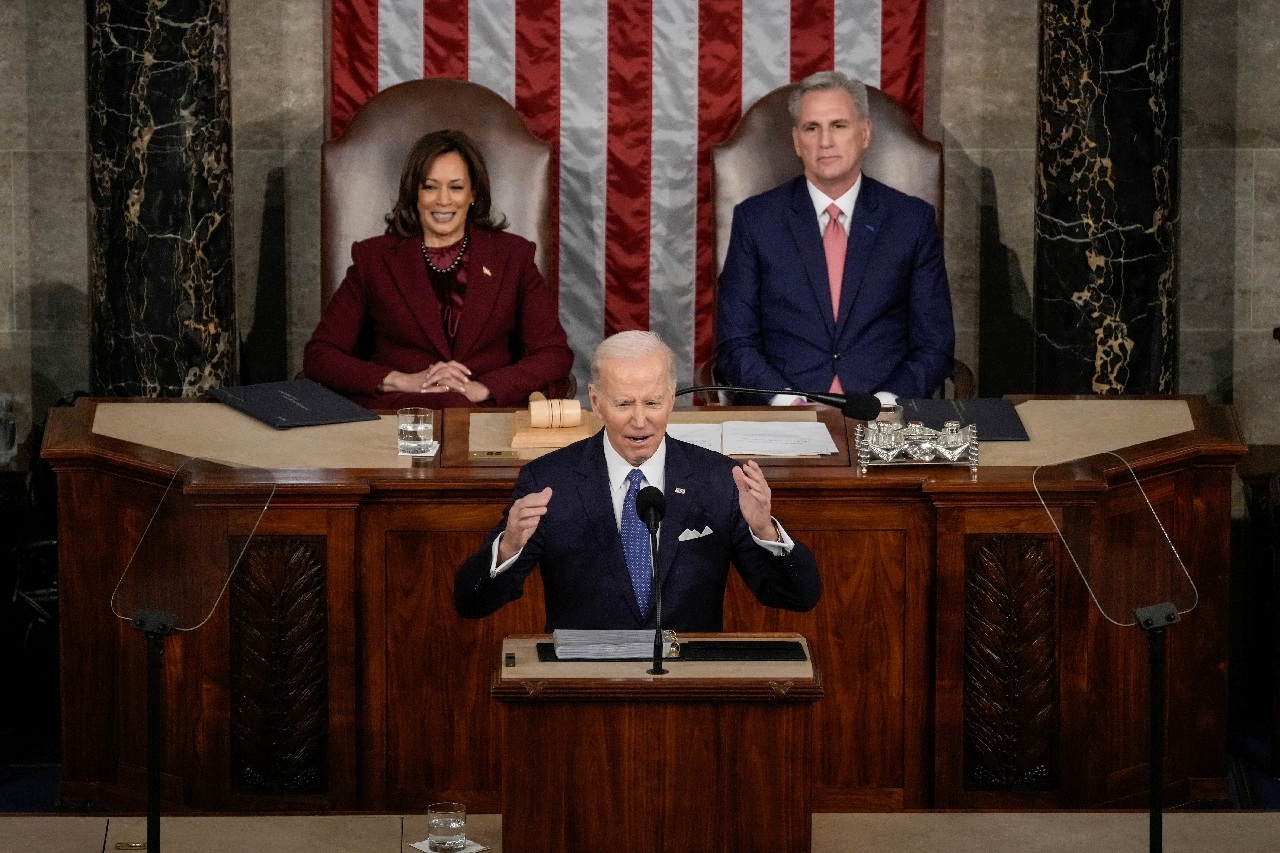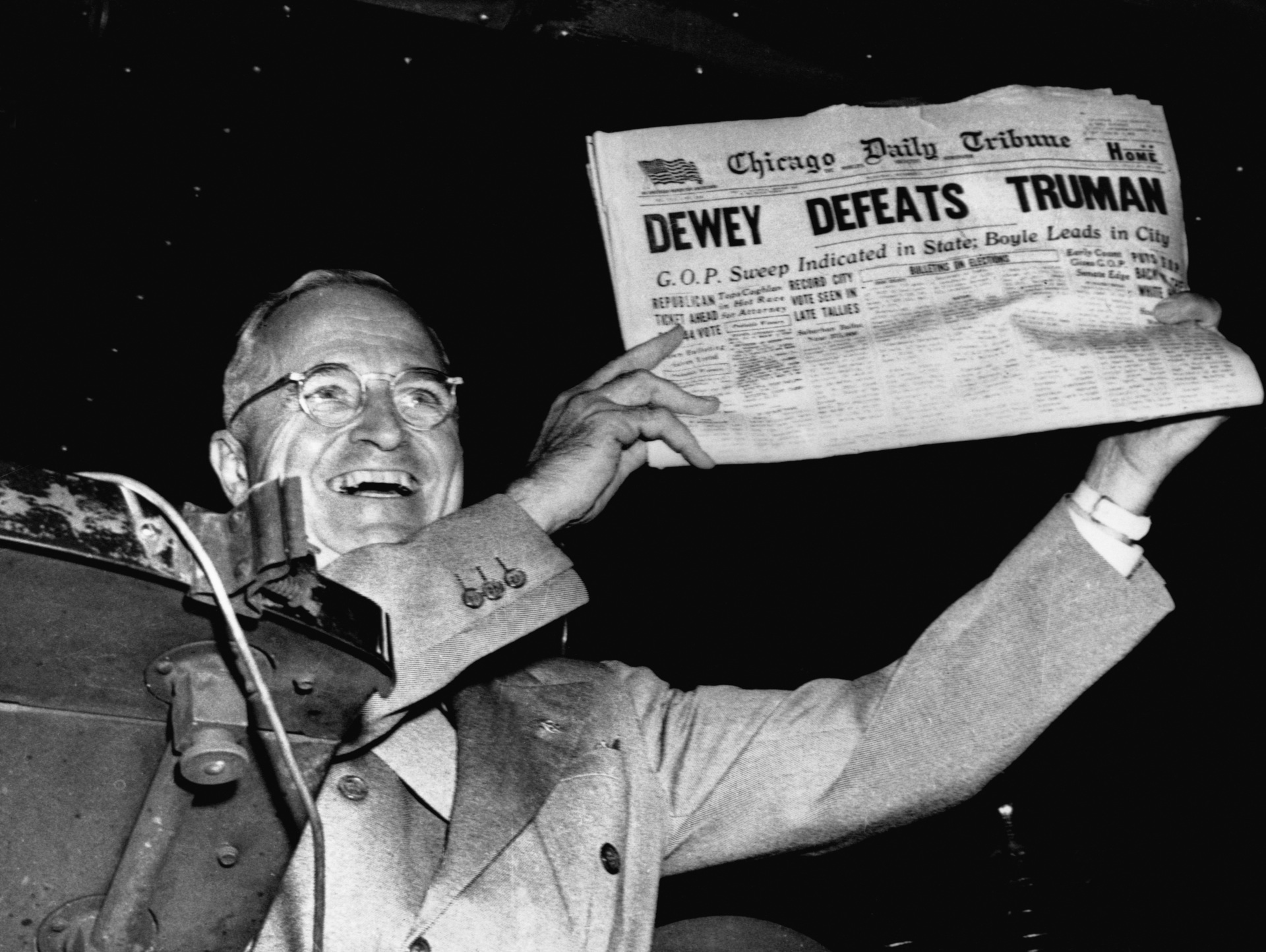
The Democratic president, a former senator from a border state, was lightly regarded and not so hot in the polls.
He had made plenty of mistakes in the Oval Office, and yet his aides knew one big thing: If they stayed on the right side of a key issue—the income security of Americans—and could paint the Republicans as being on the wrong side of that issue, they’d be fine. In fact, Republicans, enjoying newfound power on Capitol Hill, chose to pursue an unpopular ideological agenda. They played right into the Democrats’ hands.
So, the incumbent president went to work: He blasted Republicans for pursuing exotic schemes that would jeopardize the well-being of Americans, especially senior citizens.
Does that sound a bit like Joe Biden as he zinged Republicans in his State of the Union address for seeking to cut, or even transform, Social Security and Medicare? As his people issued a fact sheet on the subject? As he even went to Florida to push the message even harder? As the mainstream media played along with cheering headlines such as “Democrats would love to make 2024 an entitlements election”?

President Joe Biden delivers his State of the Union address on February 7, 2023. (AFP)
Well, if it does sound like Biden, that’s a bit scary, because actually, I was describing Harry Truman, the 33rd president, who won a big presidential victory back in 1948.
Truman had been a senator before that from a border state—Missouri, like Delaware, was a slave state that stayed in the Union during the Civil War—and not all that highly regarded, having ascended to the presidency only upon the death of his predecessor, Franklin D. Roosevelt.
Yet Truman had every intention of winning the presidency in his own right, and to help him, in November 1947, aides Clark Clifford and James Rowe composed a 43-page memorandum, outlining a clever strategy for their man. Clifford and Rowe recognized that the likely Republican presidential nominee in 1948, New York Republican governor Thomas E. Dewey, was a moderate centrist. Which is to say, Dewey might seem plausible to voters who were looking for safe change after a decade-and-a-half of Democratic domination. So aides Clifford and Rowe advised targeting instead the Republican Congress. The Capitol Hill GOP was well to the right of Dewey, and so, the Trumanites reasoned, could be portrayed as extremist and dangerous. So even though Dewey would be the name on the ballot opposite Truman, the Democrats chose to run, in effect, against Congressional Republicans.
A key issue for the Democrats was Social Security, the signature program of FDR’s New Deal. As Democrats wrote in their party platform on July 12, 1948:
We favor the extension of the Social Security program established under Democratic leadership, to provide additional protection against the hazards of old age, disability, disease or death.
Three days later, in his acceptance speech at the Philadelphia convention,Truman “gave Republicans hell” including on Social Security:
Time and again I have recommended improvements in the Social Security law, including extending protection to those not now covered, and increasing the amount of benefits.
Truman mocked Republicans for pledging that they wanted “to provide security for the aged” (they had learned the hard way, in earlier elections, not to claim that the program was “unworkable”); Truman snarled that when he made recommendations to expand the program:
Congress studied the matter for 2 years, but couldn’t find time to extend or increase the benefits. But they did find the time to take Social Security benefits away from 750,000 people, and they passed that over my veto.
He jabbed the GOP: “I wonder if they think they can fool the people of the United States with such poppycock as that!”
Powered by such sharp, contrast-drawing rhetoric, Truman won the 1948 election by a comfortable margin, 4.5 points. And this even as third and fourth party candidates, both renegade Democrats, garnered 4.7 percent of the vote. Which is to say, their votes came out of Truman’s hide. Had it been a two-man race in 1948, Truman vs. Dewey, the Missourian would have won a landslide.

President Harry S. Truman gleefully displays a premature early edition of the Chicago Daily Tribune from his train in St. Louis, Missouri, after his defeat of Thomas E. Dewey in the 1948 presidential election. (Frank Cancellare/UPI via Getty Images)
Still, Truman the man was not overwhelming. However, Truman the defender of the New Deal was a crusher. All Truman had to do was clarify the choice before the voters as New Deal vs. Anti-New Deal, and he would win. And so that’s what he did. Indeed, the further proof that Truman was riding a great blue wave of sentiment was found in that year’s Congressional elections: Democrats gained nine seats in the Senate and 75 seats in the House.
Okay, so that was 1948, a long time ago. But other observers have noticed that Bill Clinton benefited from the same dynamic—positioning himself as the champion of entitlements while blasting Republicans as heartless budget-cutters—in the 1996 presidential election, which, of course, Clinton won.
But Truman’s victory came first, and it was, including Congress, much more sweeping. For their part, Republicans not wishing to lose in 2024 would do well to study what went wrong for the GOP in both 1948 or 1996.

Bill Clinton waves to supporters flanked by his wife, Hillary Clinton, and his running mate, Al Gore, following Clinton’s victory in the 1996 presidential election on November 5, 1996. (Brooks Kraft LLC/Sygma via Getty Images)
Let’s face it, folks: Social Security is popular. These days, according to a 2022 poll from Data for Progress, 68 percent of Americans oppose privatizing the program. Moreover, 83 percent of Americans support increasing Social Security benefits. And the numbers for Medicare aren’t much different. Interestingly, one who evidently agrees with Biden is Donald Trump. Back on January 20, the 45th president declared, “Under no circumstances should Republicans vote to cut a single penny from Medicare or Social Security.” (In other countries, too, old-age pensions are popular; people feel that they have earned them, which is why nearly one million French citizens too to the streets to protest pension cuts this weekend.)
Yet as the Bidenites are eager to point out, Republicans seem to have a strange fascination with cutting and/or privatizing Social Security. You know, the way moths are fascinated by flames. On February 6, House Budget Committee chair Rep. Jodey Arrington (R-TX), joined by many other House Republicans, urged a “fast-track” deficit commission that would look at all federal spending. Within minutes, a Biden press aide dismissed the idea of a commission as a “death panel.” As we remember, the label of “death panel” is, well, the kiss of death for the proponent.
And speaking of the kiss of death, that’s what Senate Minority Leader Mitch McConnell (R-KY) delivered to his GOP colleague, Sen. Rick Scott (R-FL). Asked about a past proposal from Scott to “sunset” (review) entitlement programs—which Scott himself as disavowed, but which Democrats have gleefully remembered—McConnell said, “It’s just a bad idea. I think it will be a challenge for him to deal with this in his own reelection in Florida, a state with more elderly people than any state in America.” Now that’s a death-smack.
So finally, we have found an issue that Biden, Trump, and McConnell agree on! And that’s why any talk of entitlement cuts—be they called “changes,” or “reforms,” or whatever—is a non-starter. (And speaking of politicians attempting to “sunset” popular programs like Social Security and Medicare, it should be noted that Senator Joe Biden introduced legislation in 1975 that would do that very thing. The idea wasn’t popular then either.)
Okay, so that’s the politics. But what about the substance of the issue: the fiscal cost of these programs? According to projections, Medicare will be insolvent by 2028, even as the program’s spending is seen rising steadily throughout this century. So without a change in policy, the choice is enormous tax increases and/or bulges in the deficit and debt. And the same red-ink prognosis holds true for Medicaid and other health programs. Do Democrats want to preside over that? Most likely, Democrats will answer: We’ll cross that bridge when we come to it.
For the rest of us, the issue of saving money on entitlements while keeping faith with deserving beneficiaries is best left to another time, although I have written about it, here at Breitbart News, as far back as 2014. For for the tl;dr group: A cure is cheaper than care. It’s cheaper to beat than to treat. But Republican officeholders, looking to save money on entitlements while keeping their jobs, might have to read the whole dang thing.





